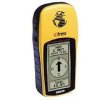Equipment And Planning For Backpack Hunting
By Allen Jones

Having been on a couple of backpack hunts that turned into survival ordeals instead of pleasant outings to reminisce about, I feel somewhat qualified to speak with a little authority on this backpack hunting subject. A few items carried along can literally mean the difference between life and death when situations turn critical on a hunt.
Archery hunting season in Colorado is a beautiful time of the year to be out in the back country...usually. I was on a backpack hunt with 2 buddies once that did not quite turn out the way we planned. The area we had planned to backpack hunt was a very remote wilderness area that was an 8 mile trek into where we were to start hunting. The weather being balmy in the days leading up to the hunt lulled us all into a false sense of security, I think.
We decided that on this backpack hunt the only shelter we would need was a tarp for a lean-to and bivy sacks for our sleeping bags. This would have been fine I think had the weather not turned for the worse on the first night. We had a light drizzle as we were rolling into our bags, and we were all thinking that this would be great for the hunting the next day. We needed a change in weather to get the elk bugling. I had brought my own 8x8 tarp since I did not have a gor-tex bivy sack like my pals did, and I just laid it on the ground and put my sleeping bag on it then rolled it over me. I was pretty snug at first, then the rain got harder, then it turned to snow, by the time there was even a hint of pink sunrise I was soaked to the core and in the first stages of hypothermia. I was cursing the fact that we did not bring along a backpack tent.
I knew I would have to get up and get a fire going quick or I was in trouble. Luckily, I had brought some large black garbage bags and had put one of these over my backpack the night before to keep things dry. I quickly jumped up, stripped naked, and pulled on my extra wool long johns and jumped into my rain suit. I then went about getting a fire started with the wet soggy wood at hand. This is where my boy scout training paid off. I was able to gather enough dry kindling and by using a SVEA gas stove as fire starter, it wasn't long before I had a life saving fire going. My 2 buddies were immediately up and warming themselves, seems their bivy sacks didn't quite cut it either and they were both soaked.
Let this be lesson #1....when on a backpack hunt carry a tent that you can bet your life on, cause you may have to. It was a long miserable hike out that day, backpacking out almost twice the weight because everything we had backpacked in was soaked, (my 2 lb goose down bag was at least 20 lbs).
Backpack hunting is a wonderful way to get your self away from the crowds and into better concentrations of game and is completely safe, if you follow a few simple guidelines and plan ahead. My main reason for backpack hunting started when I was on my first sheep hunt. It takes more or less a whole day to get to where the sheep are in this area. If I started walking in the morning I may be able to hunt the last few minutes of daylight with a long walk out in the dark as my reward, and if you spot something a long ways off there is no time for a stalk.
One of the first things I recommend doing in preparing for a backpack hunt is to pick your area and study it well in advance. What I like to do when backpack elk hunting is pick a hunting spot where you can cover the convergence of several drainages, so you can hunt one drainage each day. With your backpack camp on your back this type of hunting is easily done. Get topo maps and use Google Earth as a resource. Learn to use a GPS and make lots of notes and waypoints on the way in so there is no chance of getting lost while hunting.
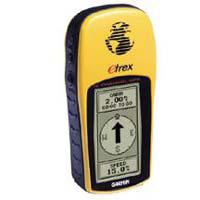
I also recommend having a hunting partner on a backpack hunt. Two heads are better than one many times, although it can definitely be done alone. Two guys sharing the load of the backpack gear makes it easier to carry the stuff needed to stay comfortable on a hunt and it also eases the workload when backpacking out game, not to mention someone to swap hunting stories with around the fire at night. Had we planned a little better on the backpack hunt I described above we would have had more than enough room for a tent as we had all brought stuff that was duplicated.
First of all you will need a good backpack. I tend to like the external frame type over the internal. Mine was a Cabela's Alaskan, with the fold down platform (better for packing meat) Whichever backpack you prefer just make sure it has a comfortable waist belt and use it properly. You should be carrying about the same amount of weight on your hips as on your shoulders. Be realistic about what you can carry comfortably.
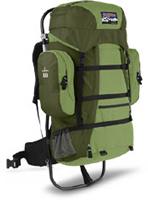
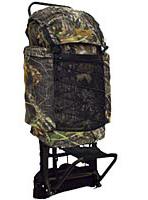
Of course everyone is gonna have the standard gear for whatever they will hunt with, archery gear or rifle stuff, so there is no need to cover which works best or the shooting tools needed, I just want to stress some basics, like a good shelter. There are so many quality tents out there these days and I do not have a preference, just remember you are going to be carrying it on your back, so lighter is better. After the backpack hunting trip mentioned above I invested in a high quality one man backpacking tent that weighed 3lbs. One piece of hunting gear that I do stress is good quality binoculars. I never carry a spotting scope when backpack hunting because of the weight, but I would rather stay home than be without my Zeiss 10X40's
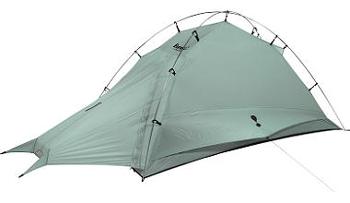
Good quality leather boots are next on my list of necessities on a backpack hunting trip. Again I don't have a particular brand to pitch here; mine are Cabela's Mountain Hunters. I like boots 8" tall to give plenty of ankle support, but make sure they are well broken-in, and carry extra laces. Don't buy a new pair the week before your hunt. Also a quality sleeping bag, rated for the weather you will be using it in. Goose down is great but you do have to keep it dry. Some of the poly filled bags these days might be the better choice. Another item I carry is a self inflating mattress pad. This insulates you from the cold ground and makes sleeping a lot more comfortable for the little weight it costs you.
Everyone's tastes are different when it comes to food so I will just touch on this. My preference has always been MRE's for backpacking. I would carry one for everyday I planned on being out, then a pound or so of minute rice and a couple packs Raman noodles. You may want to open the MRE's and take out the stuff you wouldn't need and seal them back in a zip lock bag to save a little weight. My favorite cook setup is a SVEA liquid gas fueled stove that nestles inside about a quart saucepan with a lid that served as frying pan. I can usually cook 3 or 4 times on it with one tank of gas, and of course carry a good supply of waterproof matches and a failsafe fire starter kit, it might just save your life.
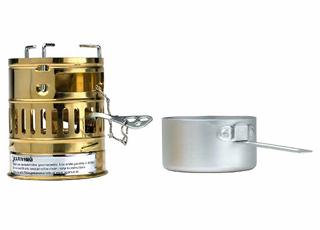
I usually plan to backpack hunt in an area with water so I would not have to carry any very far. A lightweight water purifier or tablets to disinfect water is a good idea, also a collapsible water jug. You certainly want to stay hydrated when backpacking. This is probably a good time to discuss your medical kit. Be sure and include Imodium tablets in case the water or something else gives you a dose of Montezuma's revenge. Other things such as aspirin, eye drops, Rolaids(for altitude sickness) and your preference on bandages and antibiotic creams. Also think about stuff like moleskin for blisters, and superglue for cuts. I also carry a suture kit, especially if archery hunting, and a good ace bandage. A cell phone may be a good idea these days if there is service in the area, just in case of an emergency. I noticed that there is a new device out now that is a satellite messaging device that can summon help in the event of an emergency, from practically anywhere in the world. It has GPS tracking that can lead help right to your location. Always have a backup plan and be sure and leave instructions behind, on where exactly you will be hunting.
I was always able to get by for 3-4 days on 45 to 50 lbs of backpack gear not including my rifle. Food is usually the determining factor on how many days you can stay. I would pack into the area I intended to hunt and set up camp, then with just a daypack set out on the hunt. Once while on a backpack sheep hunt, I was crossing a creek and noticed some nice sized trout that were in a shallow area, where a beaver **** had broke and left them stranded. I was able to gather them up by whipping the water over them with a stick and stunning them, thus extending my trip by a couple days, eating trout that I grilled over coals wrapped in aluminum foil. Another time on a backpack archery hunt, a grouse gave its life for a meal. So always be an opportunist when it comes to food, and carry salt and pepper, a little flour, a few other spices, and aluminum foil.
Always carry the meat processing tools you need, after all, the entire plan is to harvest game. There is not much need in this regard. A good hunting knife will do everything. I carry plastic garbage bags, some light rope and a knife sharpener. I usually quarter up the critter I get and let it hang over night to cool out, then bone out all the meat and put it in the bags before packing.....your average sized elk in the Rockies is gonna be between 3 and 5 hundred lbs, but after boning you will have approximately 150 pounds. Two guys can manage this easily carrying a boned out ham, shoulder and back strap each, with a trip back to bring out camp and maybe the cape and horns, if you intend to have him mounted. Several times I have carried an entire boned-out deer in one trip, and once did it with a bighorn ram. If you are not exactly sure how to do this there is an excellent DVD on the CDOW website that you can purchase to show you how. It should also be noted that Colorado has an excellent website with many other tips and ways to help plan your hunt.
I also carry a good quality, but lightweight nylon rain suit on all my backpack hunting trips. I tend to like wool clothing from my head to my toes, even wool/poly blend long johns and good wool socks, camera with self timer, note pad and pencil for keeping a journal, a small pillow, some add-water type refreshments like cool aid, Gatorade and some instant coffee and teabags in whatever flavor you like, and of course snacks of the lightweight variety, maybe jerky from the elk you got last year. All this stuff is very lightweight and doesn't take up much room.
One other thing I recommend doing is to go out and test your gear before you are actually on your dream backpack hunt. If something does not work well I would rather find it out while on a camping trip in the summer time, when mistakes might not be as costly.
Backpack hunting is not for everyone I understand, but if you are physically up for the challenges, it can be a very rewarding and sometimes successful hunting experience.
Post Script.....pics are all from several different backpack hunts......dall ram was from the Alaska Range on the Kuskoquim River, Bighorn Sheep at beginning of article was right out my back window in the Sangre De Cristo Mountains.
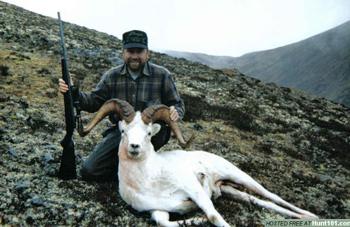
Allen is a water well contractor in central Colo. He has lived and hunted with gun and bow in Colorado since moving there in 1975. He is a former state champion and all-American trapshooter and also loves long range shooting, varmint hunting and Texas holdem poker.
By Allen Jones

Having been on a couple of backpack hunts that turned into survival ordeals instead of pleasant outings to reminisce about, I feel somewhat qualified to speak with a little authority on this backpack hunting subject. A few items carried along can literally mean the difference between life and death when situations turn critical on a hunt.
Archery hunting season in Colorado is a beautiful time of the year to be out in the back country...usually. I was on a backpack hunt with 2 buddies once that did not quite turn out the way we planned. The area we had planned to backpack hunt was a very remote wilderness area that was an 8 mile trek into where we were to start hunting. The weather being balmy in the days leading up to the hunt lulled us all into a false sense of security, I think.
We decided that on this backpack hunt the only shelter we would need was a tarp for a lean-to and bivy sacks for our sleeping bags. This would have been fine I think had the weather not turned for the worse on the first night. We had a light drizzle as we were rolling into our bags, and we were all thinking that this would be great for the hunting the next day. We needed a change in weather to get the elk bugling. I had brought my own 8x8 tarp since I did not have a gor-tex bivy sack like my pals did, and I just laid it on the ground and put my sleeping bag on it then rolled it over me. I was pretty snug at first, then the rain got harder, then it turned to snow, by the time there was even a hint of pink sunrise I was soaked to the core and in the first stages of hypothermia. I was cursing the fact that we did not bring along a backpack tent.
I knew I would have to get up and get a fire going quick or I was in trouble. Luckily, I had brought some large black garbage bags and had put one of these over my backpack the night before to keep things dry. I quickly jumped up, stripped naked, and pulled on my extra wool long johns and jumped into my rain suit. I then went about getting a fire started with the wet soggy wood at hand. This is where my boy scout training paid off. I was able to gather enough dry kindling and by using a SVEA gas stove as fire starter, it wasn't long before I had a life saving fire going. My 2 buddies were immediately up and warming themselves, seems their bivy sacks didn't quite cut it either and they were both soaked.
Let this be lesson #1....when on a backpack hunt carry a tent that you can bet your life on, cause you may have to. It was a long miserable hike out that day, backpacking out almost twice the weight because everything we had backpacked in was soaked, (my 2 lb goose down bag was at least 20 lbs).
Backpack hunting is a wonderful way to get your self away from the crowds and into better concentrations of game and is completely safe, if you follow a few simple guidelines and plan ahead. My main reason for backpack hunting started when I was on my first sheep hunt. It takes more or less a whole day to get to where the sheep are in this area. If I started walking in the morning I may be able to hunt the last few minutes of daylight with a long walk out in the dark as my reward, and if you spot something a long ways off there is no time for a stalk.
One of the first things I recommend doing in preparing for a backpack hunt is to pick your area and study it well in advance. What I like to do when backpack elk hunting is pick a hunting spot where you can cover the convergence of several drainages, so you can hunt one drainage each day. With your backpack camp on your back this type of hunting is easily done. Get topo maps and use Google Earth as a resource. Learn to use a GPS and make lots of notes and waypoints on the way in so there is no chance of getting lost while hunting.

I also recommend having a hunting partner on a backpack hunt. Two heads are better than one many times, although it can definitely be done alone. Two guys sharing the load of the backpack gear makes it easier to carry the stuff needed to stay comfortable on a hunt and it also eases the workload when backpacking out game, not to mention someone to swap hunting stories with around the fire at night. Had we planned a little better on the backpack hunt I described above we would have had more than enough room for a tent as we had all brought stuff that was duplicated.
First of all you will need a good backpack. I tend to like the external frame type over the internal. Mine was a Cabela's Alaskan, with the fold down platform (better for packing meat) Whichever backpack you prefer just make sure it has a comfortable waist belt and use it properly. You should be carrying about the same amount of weight on your hips as on your shoulders. Be realistic about what you can carry comfortably.


Of course everyone is gonna have the standard gear for whatever they will hunt with, archery gear or rifle stuff, so there is no need to cover which works best or the shooting tools needed, I just want to stress some basics, like a good shelter. There are so many quality tents out there these days and I do not have a preference, just remember you are going to be carrying it on your back, so lighter is better. After the backpack hunting trip mentioned above I invested in a high quality one man backpacking tent that weighed 3lbs. One piece of hunting gear that I do stress is good quality binoculars. I never carry a spotting scope when backpack hunting because of the weight, but I would rather stay home than be without my Zeiss 10X40's

Good quality leather boots are next on my list of necessities on a backpack hunting trip. Again I don't have a particular brand to pitch here; mine are Cabela's Mountain Hunters. I like boots 8" tall to give plenty of ankle support, but make sure they are well broken-in, and carry extra laces. Don't buy a new pair the week before your hunt. Also a quality sleeping bag, rated for the weather you will be using it in. Goose down is great but you do have to keep it dry. Some of the poly filled bags these days might be the better choice. Another item I carry is a self inflating mattress pad. This insulates you from the cold ground and makes sleeping a lot more comfortable for the little weight it costs you.
Everyone's tastes are different when it comes to food so I will just touch on this. My preference has always been MRE's for backpacking. I would carry one for everyday I planned on being out, then a pound or so of minute rice and a couple packs Raman noodles. You may want to open the MRE's and take out the stuff you wouldn't need and seal them back in a zip lock bag to save a little weight. My favorite cook setup is a SVEA liquid gas fueled stove that nestles inside about a quart saucepan with a lid that served as frying pan. I can usually cook 3 or 4 times on it with one tank of gas, and of course carry a good supply of waterproof matches and a failsafe fire starter kit, it might just save your life.

I usually plan to backpack hunt in an area with water so I would not have to carry any very far. A lightweight water purifier or tablets to disinfect water is a good idea, also a collapsible water jug. You certainly want to stay hydrated when backpacking. This is probably a good time to discuss your medical kit. Be sure and include Imodium tablets in case the water or something else gives you a dose of Montezuma's revenge. Other things such as aspirin, eye drops, Rolaids(for altitude sickness) and your preference on bandages and antibiotic creams. Also think about stuff like moleskin for blisters, and superglue for cuts. I also carry a suture kit, especially if archery hunting, and a good ace bandage. A cell phone may be a good idea these days if there is service in the area, just in case of an emergency. I noticed that there is a new device out now that is a satellite messaging device that can summon help in the event of an emergency, from practically anywhere in the world. It has GPS tracking that can lead help right to your location. Always have a backup plan and be sure and leave instructions behind, on where exactly you will be hunting.
I was always able to get by for 3-4 days on 45 to 50 lbs of backpack gear not including my rifle. Food is usually the determining factor on how many days you can stay. I would pack into the area I intended to hunt and set up camp, then with just a daypack set out on the hunt. Once while on a backpack sheep hunt, I was crossing a creek and noticed some nice sized trout that were in a shallow area, where a beaver **** had broke and left them stranded. I was able to gather them up by whipping the water over them with a stick and stunning them, thus extending my trip by a couple days, eating trout that I grilled over coals wrapped in aluminum foil. Another time on a backpack archery hunt, a grouse gave its life for a meal. So always be an opportunist when it comes to food, and carry salt and pepper, a little flour, a few other spices, and aluminum foil.
Always carry the meat processing tools you need, after all, the entire plan is to harvest game. There is not much need in this regard. A good hunting knife will do everything. I carry plastic garbage bags, some light rope and a knife sharpener. I usually quarter up the critter I get and let it hang over night to cool out, then bone out all the meat and put it in the bags before packing.....your average sized elk in the Rockies is gonna be between 3 and 5 hundred lbs, but after boning you will have approximately 150 pounds. Two guys can manage this easily carrying a boned out ham, shoulder and back strap each, with a trip back to bring out camp and maybe the cape and horns, if you intend to have him mounted. Several times I have carried an entire boned-out deer in one trip, and once did it with a bighorn ram. If you are not exactly sure how to do this there is an excellent DVD on the CDOW website that you can purchase to show you how. It should also be noted that Colorado has an excellent website with many other tips and ways to help plan your hunt.
I also carry a good quality, but lightweight nylon rain suit on all my backpack hunting trips. I tend to like wool clothing from my head to my toes, even wool/poly blend long johns and good wool socks, camera with self timer, note pad and pencil for keeping a journal, a small pillow, some add-water type refreshments like cool aid, Gatorade and some instant coffee and teabags in whatever flavor you like, and of course snacks of the lightweight variety, maybe jerky from the elk you got last year. All this stuff is very lightweight and doesn't take up much room.
One other thing I recommend doing is to go out and test your gear before you are actually on your dream backpack hunt. If something does not work well I would rather find it out while on a camping trip in the summer time, when mistakes might not be as costly.
Backpack hunting is not for everyone I understand, but if you are physically up for the challenges, it can be a very rewarding and sometimes successful hunting experience.
Post Script.....pics are all from several different backpack hunts......dall ram was from the Alaska Range on the Kuskoquim River, Bighorn Sheep at beginning of article was right out my back window in the Sangre De Cristo Mountains.

Allen is a water well contractor in central Colo. He has lived and hunted with gun and bow in Colorado since moving there in 1975. He is a former state champion and all-American trapshooter and also loves long range shooting, varmint hunting and Texas holdem poker.

